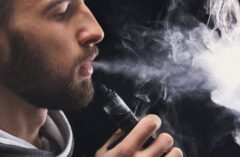Last Updated on November 27, 2019 by Team Spinfuel
In response to the backlash vapers are currently facing, 180 Smoke has created a helpful infographic that provides an accurate portrayal of the habits, preferences, and demographics of Canadian vapers.
This infographic was created using data collected from customer purchases and was conceptualized to showcase the habits of Canadian vapers. When creating the infographic, 180 Smoke chose to focus on the e-liquid preferences of vapers, their reasons for making the switch to vaping, purchasing behaviour by province, and the demographics of vapers. The majority of the information used in the infographic comes from 180 Smoke’s customer purchasing data, as well as a survey of both retail and eCommerce customers.
Adults Prefer Flavors
While many anti-vaping advocates are calling for a ban on fruit flavors, the data gathered by 180 Smoke suggests that the majority of adult vapers prefer these flavors, instead of tobacco and flavorless options. In fact, only 13% of Canadian vapers use flavorless and tobacco e-liquids, with the remaining 87% using fruit, dessert and candy flavors. This data stands in direct opposition to what many flavor-ban supporters claim, especially in regards to the notion that certain flavors of e-liquid are used only by underage vapers. Furthermore, this statistic indicates that regardless of age, vapers generally prefer more palatable flavors that happen to have widespread market appeal.
We can see that across all Canadian provinces and territories, with the exception of Yukon, the majority of vapers prefer fruity flavors over tobacco and flavorless e-liquids. This reiterates the idea that restricting e-liquids to tobacco and flavorless options would be a detriment to adult vapers, many of whom likely rely on palatable and popular e-liquids as an alternative nicotine delivery method.
Youth vaping has become a focal point in the ongoing debates, with many anti-vaping advocates claiming that the marketing and advertising used by vape companies is targeted towards younger demographics. However, it’s interesting to see that from our customer data that the 19-24 age group represents the smallest portion. While those between 35-39 and over 50 are a significant percentage of all customers.
As vaping has gained popularity, detractors claim that increases in usage are due to social reasons. In contrast, when surveyed, 65% said that they chose to vape for health reasons, with 31% vaping because of financial reasons. Only 4% claimed they vaped exclusively for social reasons, indicating that people vape for a variety of different causes.
In recent months, regulations across Canada have been proposed on both the advertisement and sale of flavored e-liquids. On November 14th, 2019, British Columbia announced that they would be pushing for the toughest regulationsin the country, which would include a limit on nicotine strength and flavor sales. P.E.I has also enacted its own regulations, raising the minimum age of smoking and vaping to 21, and banning the sale of certain e-liquid flavors.
The BC regulations would prevent the sale of most nicotine salts in convenience stores and gas stations, as well as limiting most flavored e-liquids to specialty vape shops. For those outside of major cities, these regulations are likely to be particularly impactful, with stores often being an hour’s drive away.
While regulations are sweeping the United States, these are the first strict regulations to be applied in Canada. They go beyond what many states have proposed, with a sizable increase in the provincial sales tax on vaping products, from 7% to 20%. The result is that the price of vaping hardware and e-liquids, which are already expensive when compared to the United States, will now be even pricier. Experts have argued that this could lead to vapers creating their own DIY products, which could be dangerous or introduce contamination into their liquids.
The data above shows clearly that flavors are enjoyed by adult vapers and could play a role in their decision to choose vaping as an alternative nicotine delivery method. With British Columbia and P.E.I making it tougher for customers to obtain the products that they want, the concern is that a black market could appear across the province. Based on the recent outbreak of EVALI and the apparent connection to illicit products, expansion of the black market is particularly concerning and could ultimately lead to more instances of illness.

About 180 Smoke
180 Smoke is one of Canada’s leading vape retailers, serving thousands of customers across the country, both online and in-store. Founded in 2012, 180 Smoke has grown to over 30 retail locations, across Ontario and Alberta.








